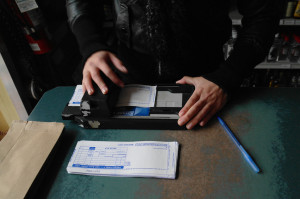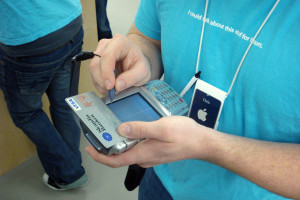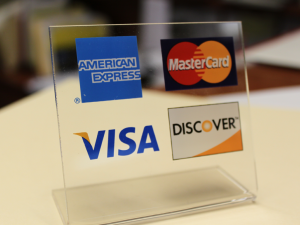Category: Merchant Services Account
October 10th, 2013 by Elma Jane
There are various payment processing rates that apply to credit and debit card transactions. Visa and MasterCard do not publish their rules and regulations or the payment processing standards required to get the lowest interchange rate. It’s up to credit card processing companies to understand and implement them to their merchants’ benefit. A high downgrade rate may indicate that your processor does not know the standards, or may be reluctant to implement best practices or new rules changes. The application of these rates is based on a variety of factors related to the particular circumstances of the sale and the way the payment is processed, as well as on the type of the card that was used. Typically payments processed in a card-not-present environment (e.g. online or over the phone) are assessed higher processing fees than payments processed in a face-to-face setting. Payments made with regular consumer types of cards are generally processed at lower rates than payments made with rewards, business-to-business or commercial cards. Debit cards are processed at lower interchange rates than credit cards. In order to simplify the pricing for their merchants, the majority of the processing companies have elected to use various tiered pricing models (two-tiered, three-tiered, six-tiered, etc.). There are three general classifications used in the various tiered pricing models:
Qualified Transaction (also referred to as the Swiped Rate) This is the rate charged per each transaction when the card is physically swiped through a credit card terminal. When a transaction is processed in accordance with the rules and standards established in the Payment Processing Agreement, signed by the merchant and the processing bank, and It involves a regular consumer credit card, It is processed at the most favorable rate. This rate is called a “Qualified Rate” and is set in the merchant’s Payment Processing Agreement. The Qualified Rate is set based on the way a merchant will be accepting a majority of their credit cards. For example, for an internet-based merchant, the internet interchange categories will be defined as Qualified, while for a physical retailer only transactions where cards are swiped through a terminal will be Qualified.
Mid-Qualified Transaction This is the rate charged when a transaction is manually keyed-in using AVS – Address Verification Service (card #, expiration date, address, zip code and CVV code all match). When a consumer credit card is keyed into a credit card terminal instead of being swiped or The cardholder uses a rewards card, business-to-business or another special type of card the transaction is charged a discount rate that is less favorable than the Qualified. This rate is called a “Mid-Qualified Rate.”
Non-Qualified Transaction This is the rate charged when manually keying-in a transaction without using AVS – Address Verification Service. When a special kind of credit card is used (like a rewards card or a business card), or a payment is not processed in accordance with the rules established in the Payment Processing Agreement, or It does not comply with some applicable security requirements.
Qualified Transaction Conditions
One electronic authorization request is made per transaction and the transaction/purchase date is equal to the authorization date. The authorization response data must also be included in the transaction settlement. The authorization transaction amount must match the settled (deposit) transaction amount. The card that is used is not a commercial (business) credit card The credit/debit card is present at the time of the transaction, the card’s full magnetic stripe is read by the terminal, and a signature is obtained from the cardholder at the time of the transaction.
The transaction must be authorized and settled under a standard retail industry code.
The transaction must be electronically deposited (batch transmitted) no later than 1 day from transaction/purchase/authorization date.
Mid-Qualified Transaction Conditions
One or more of the Qualified conditions were not met
Non-Qualified Transaction Conditions
One or more of the Qualified conditions were not met, or The card that was used was a commercial card without submitting the additional data or:
The transaction was electronically deposited (batch transmitted) greater than 1 day from the authorization date, or:
The transaction was not electronically authorized, or the authorization response data was not included in the transaction settlement.
Posted in Best Practices for Merchants, Credit card Processing, Electronic Payments, Financial Services, Merchant Services Account Tagged with: account, authorization, authorized, best, business, card, card-not-present, credit, cvv, debit, downgrade, interchange, keying, lowest, MasterCard, merchant, payment, processed, Processing, qualified, rate, rewards, standards, swiped, transaction, visa
October 3rd, 2013 by Elma Jane
Here’s how typical credit card transaction works:
When a consumer pays with a credit card, the merchant sends the details of the transaction along with the credit card information to the merchant’s bank. The merchant’s bank forwards the information to the cardholder’s bank for approval. If approved, the cardholder’s bank sends the required amount to the merchant’s bank, minus the merchant discount rate. The credit card companies don’t receive any revenue directly from interchange rates. Instead they make their money by charging the banks fees for networks, transactions and other kinds of services.
Up until April 2008, interchange rates were simple and inflexible. At that point, the company decided to move to a more dynamic system.
Interchange rates now vary from card to card, depending on the types of services and incentives offered. Typically, premium cards, which come with rewards for things like travel, cost merchants more to process. The rates also vary by type of transaction, and even by type of retailer. At times, the card companies have, for example, set special rates for grocery and gas retailers in a bid to boost credit-card use in locations where cash and debit traditionally dominated. The card companies have also introduced a growing number of premium and even super-premium cards that cost merchants more to process. The cards appeal to consumers because they contain a number of attractive incentives, such as travel and other rewards. The changes in the rate structure followed a change in the credit card companies’ business model in the mid 2000s.
Visa and MasterCard evolved from private associations owned mainly by the banks they serviced to publicly traded, profit-driven entities beholden to a wide range of shareholders. Merchants say the fees they pay to accept credit cards are rising as a result and have become increasingly unpredictable. Critics of the credit card companies say the merchant is a powerless middleman in a system that entices consumers to use their cards and banks to reap the benefits.
The credit card companies say the system benefits everyone, including merchants, by providing a rapid, secure form of payment.
Every time you use your credit card to make a purchase, the merchant pays what is called the “merchant discount fee.” The merchant discount fee is calculated as a percentage of the good or service purchased. It can range from 1.5 per cent to 3 per cent. On a $100 item, for example, the merchant could pay a fee of between $1.50 and $3.The merchant discount fee covers a number of things, such as terminal rentals, fraud protection and transaction slips. But the biggest component of it is based on the interchange rate, which is set by the credit card companies.
In a complicated twist, the credit card companies don’t make any money from the interchange rate. The banks do. The interchange rate is what makes the credit card system work. This rate ensures the banks have a financial incentive to issue and accept credit cards.
Posted in Credit card Processing, Electronic Payments, Merchant Services Account, Visa MasterCard American Express Tagged with: associations, bank, card, cardholder, charging, credit, credit-card, discount rate, dynamic, fees, financial, fraud, interchange, merchant, Merchant's, networks, payment, process, protection, Rates, rentals, secure, services, terminal, transaction, travel
October 3rd, 2013 by Elma Jane
National Transaction Gift Card Programs
Features & Benefits
Why National Transaction Gift Card? A gift card program offers you a great opportunity to boost sales by increasing customer loyalty and enhancing your business brand. Gift cards are used like credit cards and can be loaded with any dollar amount. NTC offers customized gift card processing merchant services tailored to your gift card processing needs. It’s secured and easy to manage.
Benefits to Consider:
Brand Building and Loyalty Gift cards can be a great source of advertising for your business. Gift cards are re-loadable; customers often reload them and continue to use them.
Cash Flow Enhancement Prepaid gift cards are purchased prior to customers receiving their goods and services from you. You can re-invest these dollars back into your business. Earn money; research shows that customers tend to spend more than the value of the gift card.
Easy to Manage Merchant gift cards are easy for your customers to use and easy for your employees to issue and redeem, as they work similar to credit cards.
Eliminate or Remove Cashback Don’t have to use the full balance of the card – the balance remains on the card. It can be issued for returned merchandise, thereby reducing fraud. Gift cards can only be activated by swiping through a POS terminal.
Get and Bring New Customers Using gift cards as presents (e.g. Showers, Mother’s Day, Birthdays, Graduation and Christmas) is more popular than ever before. Offering a gift card program can help bring new customers to your business, thereby increasing sales.
Increasing Brand Awareness Gift cards customized with your business name or logo are an effective way to advertise your business and leave a lasting impression with customers.
Electronic gift card vs paper certificates? An electronic gift card solution provides a number of benefits over certificates, such as:
Minimize Fraud – card are difficult to duplicate while paper certificates can be photocopies or duplicated. Save Money – cards can be reloaded. Paper certificates can only be used once. Save Time and Maximize Efficiency – gift cards can be loaded and redeemed easily, and provide electronic reporting. Paper certificates require manual work.
NTC Gift Card Operations How does a Gift Card work? Cards are activated through your NTC merchant account with a dollar value requested by your customer and not dependent on things like proprietary equipment. Once the card is activated, it’s ready to use as payment at your location.
Are my Gift Cards reloadable? Yes, and may be reloaded as many times as you wish. You may consider offering an incentive to thank your customers for their loyalty. Incentives can range from providing a free product or service from your store.
What NTC Merchant Services terminals do I need to process NTC Gift Cards?
Your NTC Gift Card will function on any Standalone, Wireless and Bluetooth terminals.
Card Ordering/Design
What is the standard gift card size? Most gift cards are the exact same size as a credit card:
What options do I have to advertise my business name on my cards?
To help promote and advertise your business brand on your cards, you can choose one of these options:
Basic – Include your company’s name, address and phone number on a pre-selected style. Standard – You can choose from an attractive selection of pre-designed card styles. Add a single color logo or customized text in your choice of font style and color.
Custom Cards – Custom cards designed by you or with our help, invest with style.
How long does it take for me to be set-up and receive my gift cards?
Your application and set-up on NTC systems will take approximately 5 – 7 business days. Non-peak times (outside Christmas) – 2 weeks Peak times – 4 to 6 weeks
How many cards I can order? Quantities of 50 for Basic, 100, 1,000 for Standard.
Posted in Best Practices for Merchants, Electronic Payments, Gift & Loyalty Card Processing, Merchant Services Account Tagged with: advertising, bluetooth, certificates, credit cards, earn, electronic, function, gift, gift Card, loyalty, merchant account, ntc, payment, POS, Processing, re-loadable, reload, reporting, secured, standalone, Swiping, terminal, terminals, value, wireless
September 30th, 2013 by Admin
Credit card processing involves three separate cost components for vendors who choose to accept this type of payment from customers for goods or services. The same cost components apply to debit cards. Only one cost component is negotiable.
The first component is an interchange fee, which is payable to the card holder’s issuing bank. It is a combination of a transaction volume percentage fee and a flat-rate transaction fee. Interchange fees are collectively agreed upon through Visa and MasterCard by a card’s issuing bank and are fixed costs.
Interchange fees take into consideration various information about a card. Types of cards include debit and credit, while categories of cards refer to commercial and reward cards. Processing methods include whether a card is swiped or manually keyed. Swiping a card is usually more economical for vendors.
Secondly, an assessment fee is charged by the card’s brand holder. Brand holders include Visa, MasterCard and Discover. Assessment fees are also fixed costs. Additionally, Visa charges a monthly fee.
The final charge is known as a processing fee. Processing fees vary among processors and is negotiable. Vendors are charged a processing fee, which can cause a difference in cost from one vendor to another. More credit card information: TopTenReviews
Jeremy is a tech blogger at TopTenReviews. He lives outside Salt Lake City, Utah
Posted in Best Practices for Merchants, Credit card Processing, Electronic Payments, Merchant Services Account, Visa MasterCard American Express Tagged with: accept, assessment, cost, credit card processing, debit cards, fees, flat-rate, interchange, keyed, payment, Processing, Rates, swiped, Swiping, transaction, volume
September 30th, 2013 by Elma Jane
National Transaction Corporation and Trams Back Office
As National Transaction Corporation Executives get to meet Sabre’s key people in Miami FL let’s know more about what Trams Back Office one of their respective products can offer.
Travel and transportation industry is evolving quickly, agility is needed in adapting to the changing customer needs. In addition to providing the right services for customers and for business.
With Trams Back Office, part of the Sabre Red travel solution, your capable to easily monitor, manage and grow your business. Trams provides right-size, right-price information technology (IT) solutions and is one of the most popular back office accounting and reporting system on the market today. It’s easy to learn and use, helping you control costs with extreme efficiency.
In addition, Trams Back Office seamlessly works withClientBase to deliver a complete solution incorporating GDS integration, CRM, General Ledger, and more.
Special Features
Credit Card Merchant – process your merchant credit card service fees and other transactions through Trams Back Office.Trams and ClientBase Products and Services has formed alliances with credit card processing companies, to bring you competitive rates and an easy-to-use interface to process agency merchant credit card service fees and other transactions through Trams Back Office.
The Credit Card (CC) Merchant Reconciliation under Payments|Reconciliation|CC Merchant Reconciliation takes the CC Merchant payments from Trams Back Office (TBO) verifies them, and sends them electronically to your credit card processor. Your credit card transactions are then processed and sent back to Trams Back Office, where TBO clears the processed items and creates the payment and the journal entry to record the activity in the General Ledger.
Add Ons
Trams Crystal Reports – measure effectiveness and efficiency by running pre-designed Crystal Reports within the Trams Back Office system. Its FREE!! Trams Crystal Reports is an add-on to ClientBase and/or Trams Back Office that offers you the ability to run pre-designed Crystal Reports in addition to those offered within the Trams Back Office and ClientBase products. TCR10 is the most recent version of Trams Crystal Reports that is integrated with Trams Back Office and ClientBase. When TCR10 is installed, you will be able to launch Trams Crystal Reports from your desktop or in Trams Back Office, using the TCR Viewer under Reports.
IC/Host Agency Export Utility- allows Independent Contractors to share invoice data with their Host Agency’s Trams Back Office system for FREE!! Agencies today are choosing to change the way they make their bookings. Many are dropping out of ARC/BSP and booking air tickets through a Host Agency. They may also book some or all of their Cruise & Tour business with a Host Agency, or continue doing those bookings as they always have. These Independent Contractor (IC) Agents working through a Host Agency, may still operate a Store Front location, or move into a “home based” environment. This utility is designed for independent contractors (IC) and host agencies to share data more efficiently. IC’s use the host’s GDS create invoices marked with their own IC code. These invoices are then interfaced into the host’s Trams Back Office (TBO) database. This utility gives the Host the ability to transfer these interfaced invoices to the IC for importing into their IC copy of Trams Back Office. To receive records from a host agency using this utility, an IC must have a copy of Trams Back Office. The utility also allows IC’s that use ClientBase to create invoices, to export those invoices and share them with the host agency.
Over View – Trams Back Office is a locally installed solution that allows agency to effectively manage entire accounting and reporting process with their Free Special Features and Free AddOns.
Posted in Credit card Processing, Electronic Payments, Merchant Services Account, Travel Agency Agents Tagged with: agencies, agency, agency's, air, Back Office, clientbase, credit card merchant, credit-card, host, payment, processor, reporting, Sabre Red, solution, store front, tickets, Trams, transportation, travel
August 19th, 2013 by Admin
1. Use newer POS systems to reduce credit card fees.
2. Find out what percentage of your gross sales go toward credit card rates.
3. Perform a statement review at least annually.
Any time a customer uses a credit card to purchase services and goods the merchant pays various rates and fees processing those transactions. Most of these fees go to the bank issuing the credit card as they take on the bulk of the risk in credit card transactions. Visa, American Express and Discover own the network on which these credit card transactions are processed on and they receive part of the fee and percentage rate as well as establish these rates and fees. Finally the bank that provides merchant account services gets part of these rates and fees.
To a small business 2, 3, or even 4% might not sound like much but when these fees are on the gross total of sales they can be significantly higher than originally thought. For this reason it’s a great idea to assess your merchant account statement to see if rates are in line and that your most frequently used cards and transaction types are getting the best rate possible. By going over your statement, you can see exactly what you pay per transaction and get details about your most common transaction types and credit card used to get the process going. Knowing how to untangle the various levels of pricing rates and fees can be daunting if you don’t know what they mean. If you are unfamiliar with what these rates and fees mean on your statement companies like National Transaction can perform the review for you. Free of charge.
Ultimately the best thing to have is a merchant account service provider that will take the time to go over your business with an eye lowering your rates and fees. The savings can be significant. As a business grows it changes and there should be an ongoing strategy at maintaining the best processing rates and fees possible. Today with so many different credit card types, like rewards cards, airline miles programs and more it can pay off to check once or twice a year.
Posted in Best Practices for Merchants, Credit card Processing, Electronic Payments, Merchant Services Account Tagged with: account, American Express, bank, card, credit, fees, MasterCard, merchant, process, Processing, Rates, services, Visa MasterCard American Express
August 15th, 2013 by Admin
The Federal Trade Commission recently charged a merchant account provider with violating federal law. The business sells credit card and debit card payment processing services to other small businesses in a business to business or B2B fashion. Allegedly the business made unsubstantiated and false claims to unwary businesses. Read more of this article »
Posted in Credit card Processing, Electronic Payments, Merchant Services Account, Visa MasterCard American Express Tagged with: b2b, credit card processing, FTC, ISO, merchant account, merchant services, MSD, terminal, transaction
As a society, our smartphones are increasingly becoming a more important in our daily lives. Already replacing watches, alarm clocks, wallets and calendars today we carry our smartphones with us everywhere, including the bathroom. While smartphone users are traveling everywhere with their smartphones, are they actually booking travel with their smartphones? eMarketer asked that very question in a survey of 1,200 internet users and asked about their travel booking habits on the internet. The responses indicate that 40% of digital travel researchers will use their smartphones and tablets and mobile payments to complete travel bookings. Read more of this article »
Posted in Merchant Services Account Tagged with: agencies, agent, agents, credit card, e-commerce, gateway, ipad, Iphone, laptop, merchant account, notebook, smartphone, tablet, ticketless, travel






